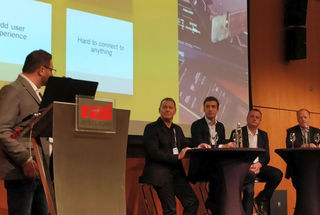The Hunger Games: Hospitality Innovation

I wanted to recap on a very interesting panel I participated in at last months HITEC Amsterdam. The topic was why do start-ups and innovative solutions struggle to achieve rapid growth in the hospitality industry?
We had a great diversity of opinions and positions represented:
- Richard Oram senior director of sales consulting hospitality systems (EMEA) at Oracle
- Anders Johansson co-founder and CEO at Demand Calendar
- Pete Simpson SVP Global Business Technology with Protel hotelsoftware GmbH
- Florian Montag co-Founder and CEO at Hotelhero
- David Turnbull (Moderator) co-founder and CCO at SnapShot GmbH
A cry for open systems and industry standards
We all know it too well, data in the hospitality space exists in silos. Even when the systems have existing integrations there is a lack of standardization. All providers input data in different formats, quality levels, and make it difficult for 3rd party systems to consolidate and analyse these data points.
The first step to solve this is to push and reinforce industry standards. HTNG has done a good job in the past but has not been too active in updating these standards, in the last couple of years. Opentravel has just released their new modern OTA 2.0 standard. These initiatives are very important for the industry, but it is essential for the legacy vendors to adopt them and take on the challenge to renew their dated integration technology.
This would be the first step to break down the silos, as it will facilitate integrations and improve the quality of transferred data. Breaking down these silos is important for comprehensive business intelligence and deliver actionable insights for the hotelier.
What Operating System should I develop against?
In Europe alone, there are over 300 different hotel operating systems and worldwide the largest hotel operating system has roughly 35'000 hotels. As a point of comparison, in the B2C space, there are 3-4 different operating systems giving you access to millions of users globally.
This is a big problem for a lot of start-ups, as they underestimate the time and resources it costs to build integrations to get access to their target market. Not even considering the fact, that to be able to build an integration with one of the big players you will need to prove your track record.
For a lot of these startups building these point-to-point integrations is highly inefficient. A point-to-multipoint approach would allow start-ups faster growth potential with fewer resources spent. In recent years, there has been a clear trend towards this model with new marketplaces or middleware emerging, which focus on enabling these point-to-multipoint integrations.
It is essential for both start-ups and legacy systems to embrace this, as it will reduce the time and resources spent on building and maintaining integrations and free it up for product development.
The marketplace - Get, try, like, buy
The aforementioned integration difficulties lead to a severe problem in today's hotel technology landscape.
Most of the time it is the large vendors who decide which new system will make it in the market and not the actual users. They do this based on their own interest and judgment and not based on a detailed analysis of the product or market opportunity.
The marketplace concept has the possibility to solve this pain point by facilitating integrations, pushing transparency and allowing flexibility for hoteliers.
- Test phases and monthly subscription models will allow hoteliers to test a variety of solutions and choose the one, which performs best.
- Rating systems or performance stats could be developed and allow hoteliers to decide who will make it or not.
Advice for startups:
- Talk to the hoteliers and make sure that you understand their pain points and goals. Not every guest-facing problem is an actual industry problem.
- Do your industry research, analyse your potential competitors and find out if there is an actual demand.
- Understand who the end user in the hotel will be (GM, FO, RM, etc.). They do not have the same requirements and understanding of technology.
- Choose very carefully with whom you integrate, too much point-to-point integration will hinder your development.
- Join forces with like-minded start-ups to create economies of scale or increase your value proposition as a bundle.
Advice for legacy systems:
- Innovation is not just a one-way street, make sure you embrace new technologies and stay relevant in the future (let's not have a Kodak or Nokia moment ;))
- Work together and push for a modern integration standard.
- If you don't have the time to manage all integration requests, work with third-party middleware's or marketplaces.
- It shouldn't be the vendor deciding which startup makes it, but the end-user.
My take:
It is great to see that tech start-ups are disrupting the industry and pushing legacy players to reinvent themselves. Providers need to be open, flexible and transparent. Locking your customers in with closed systems and long-term contracts should be a thing of the past.
About Hotelhero
Hotelhero is the online platform for hotel software. Hotelhero centralizes the search process and simplifies the technology selection for hotels. The platform introduces transparency into the hotel-tech market and helps hoteliers to make educated and confident purchasing decisions. Julien Schmit, Thibault Gence and Florian Montag founded the company in 2017 and officially brought Hotelhero on the market in April 2018.
Website: Hotelhero.tech I Twitter: @Hotelhero1 I Facebook: facebook.com/hotelhero.tech I Linkedin: @Hotelhero
Florian Montag
Co-Founder
Hotelhero GmbH